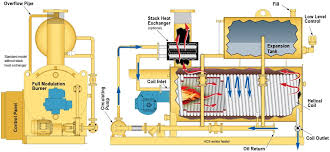
Nov . 24, 2024 21:01 Back to list
Understanding the Functionality of Boilers for Supplying Hot Water
How Does a Boiler Work for Hot Water?
Boilers are crucial components in many residential and commercial heating systems. Their primary function is to generate hot water that can be utilized for various applications such as heating spaces, providing hot water for washing, and even powering certain types of equipment. Understanding how a boiler works for hot water is essential for homeowners and building managers alike, as it can help in making informed decisions regarding installation, maintenance, and energy efficiency.
Types of Boilers
Boilers can be categorized into several types based on their design and operational principles. The primary types include
1. Combi Boilers These are compact units that provide both heating and hot water on demand. They do not require a hot water storage tank and are ideal for smaller spaces. 2. System Boilers These have a separate hot water storage cylinder but use the existing boiler infrastructure for heating. They are suitable for homes with higher hot water demands.
3. Regular Boilers Also known as conventional or traditional boilers, these systems use a hot water tank and require a cold water tank. They are best for larger homes with multiple bathrooms.
The Heating Process
The working principle of a boiler involves several key steps, and understanding this process is vital for anyone looking to use a boiler for hot water.
1. Cold Water Supply The process begins with cold water entering the boiler from the main supply. This water is typically fed into the boiler system via pipes.
2. Heating the Water Inside the boiler, there is a heat exchanger or combustion chamber where the heating occurs. For gas or oil-fired boilers, a burner ignites fuel, which generates heat. For electric boilers, electrical resistance coils serve the same purpose. The heat produced is then transferred to the water flowing through the heat exchanger.
3. Hot Water Distribution Once heated, the hot water is directed through pipes to either heating systems (like radiators) or faucets and fixtures for domestic use. The design of the system will determine how the hot water is distributed throughout the building.
4. Pressure and Temperature Control Most modern boilers come with built-in pressure and temperature control mechanisms. These features help ensure that the water reaches the desired temperature while maintaining safe pressure levels, preventing any potential hazards or damage to the system.
how does a boiler work for hot water

Advantages of Using a Boiler for Hot Water
- Efficiency Boilers are known for their energy efficiency, particularly in comparison to other heating systems like traditional electric heaters. Modern condensing boilers can achieve efficiency ratings of over 90%, which means more of the fuel consumed is turned into usable heat.
- Versatility Boilers can serve multiple functions, supplying hot water for space heating as well as domestic hot water needs. This dual functionality makes them an excellent choice for many households.
- Consistent Water Temperature Unlike some other heating systems, boilers can provide a consistent and reliable supply of hot water. This is particularly advantageous in homes with high water usage.
Maintenance Tips
To ensure that your boiler operates efficiently and effectively, regular maintenance is essential. Here are some tips for maintaining a hot water boiler
- Annual Inspections It is advisable to have a professional inspect your boiler at least once a year. This can help identify any potential issues before they become serious problems.
- Check for Leaks Regularly inspect for any signs of leaks around the boiler or the piping. Addressing these issues promptly can prevent more extensive damage and costly repairs.
- Bleed Radiators If you have a hot water heating system, periodic bleeding of the radiators can help remove trapped air, ensuring even heat distribution.
- Monitor Pressure Levels Keep an eye on the pressure gauge to ensure it remains within the recommended range. Low pressure can indicate a leak, while high pressure can lead to system failures.
Conclusion
Understanding how a boiler works for hot water is vital for homeowners looking to maximize their heating efficiency and comfort. From the initial heating process to the distribution of hot water, each component plays a significant role in the overall function of the system. By recognizing the importance of proper maintenance and the advantages of different boiler types, homeowners can make informed decisions that enhance their living environments. Whether for comfort or convenience, a well-functioning boiler is an invaluable asset in any home.
-
High-Efficiency Commercial Oil Fired Steam Boiler for Industry
NewsJul.30,2025
-
High-Efficiency Biomass Fired Thermal Oil Boiler Solutions
NewsJul.30,2025
-
High Efficiency Gas Fired Thermal Oil Boiler for Industrial Heating
NewsJul.29,2025
-
High-Efficiency Gas Fired Hot Water Boiler for Sale – Reliable & Affordable
NewsJul.29,2025
-
High Efficiency Biomass Fired Hot Water Boiler for Industrial and Commercial Use
NewsJul.29,2025
-
High-Efficiency Biomass Fired Hot Water Boiler for Industrial Use
NewsJul.28,2025
Related PRODUCTS






















